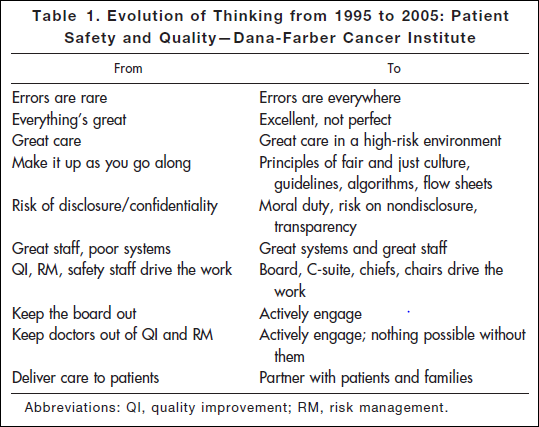January 21st, 2011 by DavedeBronkart in Health Tips, Opinion
No Comments »

There are several stages in becoming an empowered, engaged, activated patient — a capable, responsible partner in getting good care for yourself, your family, whoever you’re caring for. One ingredient is to know what to expect, so you can tell when things seem right and when they don’t.
Researching a project today, I came across an article* published in 2006: “Key Learning from the Dana-Farber Cancer Institute’s 10-Year Patient Safety Journey.” This table shows the attitude you’ll find in an organization that has realized the challenges of medicine and is dealing with them realistically:

“Errors are everywhere.” “Great care in a high-risk environment.” What kind of attitude is that? It’s accurate.
This work began after the death of Boston Globe health columnist Betsy Lehman. Long-time Bostonians will recall that she was killed in 1994 by an accidental overdose of chemo at Dana-Farber. It shocked us to realize that a savvy patient like her, in one of the best places in the world, could be killed by such an accident. But she was.
Five years later the Institute of Medicine’s report “To Err is Human” documented that such errors are in fact common — 44,000 to 98,000 a year. It hasn’t gotten better: Last November the U.S. Inspector General released new findings that 15,000 Medicare patients are killed in U.S. hospitals every month. That’s one every three minutes. Read more »
*This blog post was originally published at e-Patients.net*
September 10th, 2010 by DavedeBronkart in Better Health Network, Health Policy, Health Tips, Opinion
No Comments »

The “Running A Hospital” blog has another discussion of dealing with medical error. This time, the hospital has opened up an error of its own (a “wrong side” surgery) for examination by the Open School of the Institute for Healthcare Improvement (IHI).
Sample comments:
— From IHI’s Jim Conway: “Our systems are too complex to expect merely extraordinary people to perform perfectly 100 percent of the time. We as leaders must put in place systems that support great practice by people who suffer from being human and will make mistakes.”
— From a patient who had two surgical errors in ten months: “After years of suffering through our incredibly brutal tort(ure) system I finally had the chance to talk to the surgeon. The most meaningful words he spoke were the descriptions of how badly he suffered also from the event we shared in that OR. Finally I was not alone!”
As we’ve often said, participatory medicine brings a new kind of partnership between patient and caregiver. Neither denial nor a Wall of Silence (famous book) has any place in a healthy relationship. It breaks my heart to think of the good lives that are ruined by our cultural inability to deal with honest errors in complex situations.
Yes, as Linda Kenney of MITSS mentions in a comment, some employees (in any industry) are reckless and must be weeded out. That too can be a denial issue. But first, we need open discussion.
*This blog post was originally published at e-Patients.net*
July 12th, 2010 by BarbaraFicarraRN in Better Health Network, Health Policy, Opinion
No Comments »

From KevinMD’s medical blog, guest post by Toni Brayer, M.D., shares a story where a team approach in medicine is critical for quality patient care.
Dr. Brayer writes:
“Medicine is a team sport and it is only when the team is humming and everyone is working together that patients can have good outcomes. Hospital errors, medication errors, poor communication between doctors and nurses are prevented by adherence to protocols that everyone follows. It takes laser focus, measuring outcomes and a great deal of hard work to ensure everyone is pulling together in a hospital. The fact that these bedside nurses take the time to work on error reduction and patient safety is really amazing. Have you seen how hard nurses work? My hat is off to these dedicated caregivers.”
Dr. Brayer is exactly right when she writes “medicine is a team sport.” Read more »
*This blog post was originally published at Health in 30*













